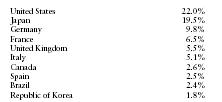The United Nations Budget - Assessed contributions of member states to the regular budget
The scale of contributions of member states is established by the General Assembly on the recommendation of its Committee on Contributions. The basic original criterion for the apportionment of UN expenses was the ability to pay, with comparative estimates of national income taken as the fairest guide. Other factors, such as the comparative income per capita, the ability of contributors to obtain foreign exchange, and, until 1974, the dislocation of national economies arising out of World War II, also were taken into account. In this way, the US share was at first 39.89 percent, gradually declining to 31.52 percent for 1971–73.
In 1972, the General Assembly established a ceiling on the rate of assessment of the highest contributor, set at 25 percent. At the same time, it lowered the minimum rate of assessment to 0.02 percent (later lowered to 0.01 percent and in 1997 lowered again, to 0.001 percent) and requested the Committee on Contributions to give attention to the special economic and financial problems of developing countries. In 2000, the General Assembly adopted a new scale of assessments, lowering the ceiling of the amount to be paid by any single country from 25 to 22 percent.
In an effort to introduce what it termed greater fairness and equity in the scale of assessments, the General Assembly, in 1981, requested the Committee on Contributions to prepare a set of guidelines for the collection of more uniform and comparable data and statistics from member states and to study alternative methods of assessing "the real capacity of member states to pay."
The top ten contributors for 2003 would be assessed at the following rates (percentages):

| United States | 22.0% |
| Japan | 19.5% |
| Germany | 9.8% |
| France | 6.5% |
| United Kingdom | 5.5% |
| Italy 5.1% | |
| Canada | 2.6% |
| Spain | 2.5% |
| Brazil 2.4% | |
| Republic of Korea | 1.8% |